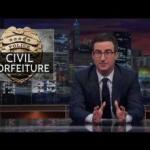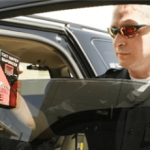BEFORE THE ENTIRE BENCH
WEAVER, J.
In this case we consider the proper application of the exclusionary rule in a civil forfeiture proceeding in which the property subject to forfeiture has been illegally seized. We further consider whether In re Forfeiture of United States Currency, 166 Mich. App. 81; 420 N.W.2d 131 (1988), was correctly decided. In deciding these questions, we first hold that under Immigration & Naturalization Service v Lopez-Mendoza, 468 U.S. 1032; 104 S. Ct. 3479; 82 L. Ed. 2d 778 (1984), illegally seized property is not immune from forfeiture. We also agree with the holding in United States v $ 639,558, 293 U.S. App DC 384, 387; 955 F.2d 712 (1992), that property subject to forfeiture that was illegally seized "is not 'excluded' from the proceeding entirely." Instead, the illegally seized property "may be offered into evidence for the limited purpose of establishing its existence, and the court's in rem jurisdiction over it." Id.
Because we find that the exclusionary rule was never meant to preclude illegally seized property from a subsequent civil forfeiture proceeding involving that property, we hold that, in accord with In re Forfeiture of United States Currency and MCL 333.7521, as long as the order of forfeiture can be established by a preponderance of evidence untainted by the illegal search and seizure, the forfeiture is valid.
For the reasons summarized by the Court of Appeals in its decision affirming the circuit court's judgment and order, we agree with the Court of Appeals that the circuit court did not clearly err in finding that, although the money was illegally seized, there was a preponderance of untainted evidence to support a finding of civil forfeiture pursuant to MCL 333.7521(1)(f).
Accordingly, we affirm the Court of Appeals judgment and we further conclude that the Court of Appeals in In re Forfeiture of United States Currency reached the correct result.
FACTS
Claimant Tamika S. Smith was driving west on I-94 when she was stopped for speeding by Michigan State Trooper James Lass. Smith was traveling with her two small children in a rental car rented by her adult male passenger, claimant Todd F. Fletcher. Trooper Lass obtained photo identification in the form of a driver's license from both Smith and Fletcher and checked both licenses for outstanding warrants. Lass discovered that Smith's license had been suspended, and that Fletcher's license was valid, but that Fletcher had been identified as an individual to whom "officer safety caution" applied. After checking Fletcher's criminal history, Trooper Lass learned that Fletcher had been arrested previously for possession of cocaine and for weapons offenses. On the basis of this information, Trooper Lass returned to the rental car and apparently advised Smith that he was going to search the trunk of the rental car, in which Trooper Lass subsequently discovered a backpack containing $ 180,975 in cash. 1 Smith was cited for speeding and driving on a suspended license. 2
1 Because it was not clear that Smith consented to the search of the trunk, after an evidentiary hearing, the trial court granted Smith's motion to suppress evidence of the backpack and its contents on the ground that the seizure was illegal under the Fourth Amendment, US Const, Am IV; Const 1963, art 1, § 11.
2 No criminal charges arising out of this incident were ever filed against Smith.
The state filed a complaint for forfeiture of the currency discovered in the backpack pursuant to MCL 333.7521(1)(f). Before the forfeiture proceeding, claimant Smith filed a motion to suppress evidence of the backpack and its contents on the basis that the evidence was illegally seized in violation of the Fourth Amendment because Smith did not consent to the search of the rental car. The circuit court agreed with Smith, determined that there was no probable cause to search the trunk of the car, and granted Smith's motion to suppress.
While the circuit court ruled that the $ 180,975 in currency was suppressed, the court allowed the prosecutor to introduce other evidence during the forfeiture proceeding. Specifically, the prosecutor presented evidence to show that Smith was a drug courier and that the $ 180,975 seized by Trooper Lass had been intended for the purchase of illegal drugs. The prosecutor submitted evidence that in the three months before Smith was stopped for speeding, Smith had rented several different rental cars at least four times for three days each time; that she had driven for several hundred miles on each occasion, but could not recall where she had driven; and that Smith's tax records indicated that she generally earned between $ 4,000 and $ 5,000 a year and had no income in 2002, the year when she was stopped for speeding.
In addition, an expert in the area of illegal drug trafficking testified that I-94, the highway on which Smith was driving when she was stopped, is a recognized major drug corridor between Detroit and Chicago, with large amounts of cash found in rental cars traveling west, and large amounts of illegal drugs recovered in rental cars going east. The circuit court further found that Smith's explanation of how she came to be traveling with $ 180,975 in cash was neither consistent nor credible. Ultimately, the court ruled in favor of forfeiture, concluding that, even when the illegally seized evidence is excluded, the prosecutor established by a preponderance of the evidence that the money was intended to buy illicit drugs.
Claimant Smith appealed, and the Court of Appeals, finding no clear error, affirmed the forfeiture. 3 Smith sought leave to appeal the Court of Appeals decision, and we granted leave to appeal to consider "(1) the proper application of the exclusionary rule in a forfeiture proceeding in which the property subject to forfeiture has been illegally seized, and (2) whether In re Forfeiture of United States Currency, 166 Mich. App. 81; 420 N.W.2d 131 (1988), was correctly decided." 4
3 In re Forfeiture of $180,975, unpublished memorandum opinion of the Court of Appeals, issued December 28, 2004 (Docket No. 249699).
4 In re Forfeiture of $ 180,975, 475 Mich. 909; 717 N.W.2d 336 (2006).
STANDARD OF REVIEW
This Court reviews de novo questions of law. Cowles v Bank West, 476 Mich. 1, 13; 719 N.W.2d 94 (2006). The proper application of the exclusionary rule in a civil forfeiture proceeding is a question of law subject to review de novo. People v Stevens (After Remand), 460 Mich. 626, 631; 597 N.W.2d 53 (1999). A trial court's decision in a forfeiture proceeding will not be overturned unless it is clearly erroneous. 5 A finding is clearly erroneous where, although there is evidence to support it, the reviewing court is firmly convinced that a mistake has been made. 6
5 People v Burrell, 417 Mich. 439, 448; 339 N.W.2d 403 (1983); People v United States Currency, 148 Mich. App. 326, 329; 383 N.W.2d 633 (1986).
6 Kitchen v Kitchen, 465 Mich. 654, 661-662; 641 N.W.2d 245 (2002).
ANALYSIS
Application of the Exclusionary Rule to Civil Forfeiture under MCL 333.7521
A forfeiture proceeding pursuant to MCL 333.7521(1)(f) is a proceeding in rem. As such, the item that is the subject of the forfeiture proceeding is the "offender" and the "claimant" is the owner, or perhaps only a possessor, of the item in question. As the United States Supreme Court explained in Various Items of Personal Property v United States: 7
It is the property which is proceeded against, and, by resort to a legal fiction, held guilty and condemned as though it were conscious instead of inanimate and insentient. In a criminal prosecution it is the wrongdoer in person who is proceeded against, convicted and punished. The forfeiture is no part of the punishment for the criminal offense. Origet v United States, 125 U.S. 240, 245-247; 8 S. Ct. 846; 31 L. Ed. 743 (1888).
7 282 U.S. 577, 581; 51 S. Ct. 282; 75 L. Ed. 558 (1931).
In One 1958 Plymouth Sedan v Pennsylvania, 380 U.S. 693; 85 S. Ct. 1246; 14 L. Ed. 2d 170 (1965), the United States Supreme Court held that the exclusionary rule applied to forfeiture proceedings because forfeiture proceedings are quasi-criminal in nature. In this case, the prosecutor has raised questions about the continuing viability of One 1958 Plymouth Sedan. However, the prosecutor has not appealed the suppression order and, therefore, this issue is not before us. Nevertheless, while One 1958 Plymouth Sedan has not been overruled and, thus, is still applicable, several subsequently decided cases indicate that the underpinnings of One 1958 Plymouth Sedan have been weakened.
For example, when the United States Supreme Court was presented with the question whether to exclude evidence from a federal civil tax proceeding on the basis that the evidence was obtained by a state law-enforcement officer relying in good faith on a defective warrant, the Court declined to extend the exclusionary rule to the federal proceeding. 8 In so holding, the Court recognized that the primary purpose of the exclusionary rule, which is a judicially created remedy, is to deter future unlawful police conduct. As such, courts impose the exclusionary rule in criminal proceedings to deter police officers from making future illegal searches and seizures. Thus, the United States Supreme Court recognized that to further extend the exclusionary rule would not be prudent given that "the additional marginal deterrence provided by forbidding a different sovereign from using the evidence in a civil proceeding surely does not outweigh the cost to society of extending the rule to that situation." 9
8 United States v Janis, 428 U.S. 433, 454; 96 S. Ct. 3021; 49 L. Ed. 2d 1046 (1976).
9 Id. at 453-454. See also Lopez-Mendoza, supra at 1041-1042 (during civil deportation proceeding, court declined to apply exclusionary rule to bar admission of illegally seized evidence); Pennsylvania Bd of Probation & Parole v Scott, 524 U.S. 357, 366-367; 118 S. Ct. 2014; 141 L. Ed. 2d 344 (1998) (exclusionary rule does not bar admission of evidence at parole revocation hearing even though evidence obtained in violation of Fourth Amendment).
In Pennsylvania Bd of Probation & Parole v Scott, 524 U.S. 357, 363; 118 S. Ct. 2014; 141 L. Ed. 2d 344 (1988), the United States Supreme Court explained that it has "repeatedly declined to extend the exclusionary rule to proceedings other than criminal trials." Additionally, the Supreme Court has declined to apply the exclusionary rule when the proceedings fall outside the offending officer's primary focus. 10 The Court has "never suggested that the exclusionary rule must apply in every circumstance in which it might provide marginal deterrence." 11 The deterrent function is strongest where the unlawful conduct would result in a criminal penalty. 12 Extending the rule beyond the officer's primary zone of interest would have, at most, only an incremental deterrent effect. 13
10 See Janis, supra, Lopez-Mendoza, supra, and Scott, supra.
11 Scott, supra at 368.
12 See id.
13 Id.
As acknowledged by the Court of Appeals in In re Forfeiture of United States Currency, "the Michigan forfeiture statute [MCL 333.7521(1)(f)] closely parallels the analogous federal statute, 21 USC 881(a)(6)." 14 MCL 333.7521(1)(f) 15 is contained within the controlled substances article of the Public Health Code. In summary, § 7521(1)(f)provides for the forfeiture of "any thing of value that is furnished or intended to be furnished in exchange for a controlled substance . . . in violation of this article [or] that is traceable to an exchange for a controlled substance, . . . or that is used or intended to be used to facilitate any violation of this article . . . ." 16 Forfeiture proceedings under the administrative section of the Michigan Public Health Code are not within the offending police officer's primary zone of interest. The primary goal of a police officer is to collect evidence to be used to convict a defendant in a criminal proceeding. The police officer's main focus is not on obtaining evidence for a civil forfeiture action.
14 21 USC 881(a)(6) provides:
The following shall be subject to forfeiture to the United States and no property right shall exist in them:
* * *
(6) All monies, negotiable instruments, securities, or other things of value furnished or intended to be furnished by any person in exchange for a controlled substance in violation of this subchapter, all proceeds traceable to such an exchange, and all monies, negotiable instruments and securities used or intended to be used to facilitate any violation of this subchapter, except that no property shall be forfeited under this paragraph to the extent of the interest of an owner, by reason of any act or omission established by that owner to have been committed or omitted without the knowledge or consent of that owner.
15 MCL 333.7521(1)(f) states:
The following property is subject to forfeiture:
* * *
(f) Any thing of value that is furnished or intended to be furnished in exchange for a controlled substance, an imitation controlled substance, or other drug in violation of this article that is traceable to an exchange for a controlled substance, an imitation controlled substance, or other drug in violation of this article or that is used or intended to be used to facilitate any violation of this article including, but not limited to, money, negotiable instruments, or securities. To the extent of the interest of an owner, a thing of value is not subject to forfeiture under this subdivision by reason of any act or omission that is established by the owner of the item to have been committed or omitted without the owner's knowledge or consent. Any money that is found in close proximity to any property that is subject to forfeiture under subdivision (a), (b), (c), (d), or (e) is presumed to be subject to forfeiture under this subdivision. This presumption may be rebutted by clear and convincing evidence.
16 Id. MCL 333.7104(2) provides, "'Controlled substance' means a drug, substance, or immediate precursor included in schedules 1 to 5 of part 72." Or, put more simply, a "controlled substance" is an illegal drug.
We further note, as amicus curiae, the Prosecuting Attorneys Association of Michigan (PAAM), correctly observes, that there is a distinction between civil and criminal forfeiture proceedings. As mentioned in Various Items of Personal Property, supra at 580-581:
At common law, in many cases, the right of forfeiture did not attach until the offending person had been convicted and the record of conviction produced. But that doctrine did not apply, as this court in an early case pointed out, where the right of forfeiture was "created by statute, in rem, cognizable on the revenue side of the exchequer. The thing is here primarily considered as the offender, or rather the offense is attached primarily to the thing; and this, whether the offense be malum prohibitum, or malum in se." The Palmyra, [25 U.S. (12 Wheat) 1, 14; 6 L. Ed. 531 (1827)].
There is an additional distinction between civil and criminal forfeitures, namely that the latter are punitive in nature, while the former are not. Section 7521(1)(f) is not a criminal statute. There are no penalties or fines associated with a violation of this section. Further, there are no provisions for inquiry into the guilt or innocence of the owner or possessor of the item subject to forfeiture. Instead, the intent of civil forfeiture statutes like § 7521(1)(f) is to remove from circulation all cash, property, and contraband used to further drug trafficking. Indeed, in Bennis v Michigan, 17 the United States Supreme Court affirmed this Court's decision that forfeiture under Michigan's nuisance abatement statute 18 was appropriate even when the joint owner of the forfeited vehicle was innocent. In so holding, the United States Supreme Court stated:
[Petitioner] claims she was entitled to contest the abatement by showing she did not know her husband would use it to violate Michigan's indecency law. But a long and unbroken line of cases holds that an owner's interest in property may be forfeited by reason of the use to which the property is put even though the owner did not know that it was to be put to such use. [Id. at 446 (emphasis added).]
17 516 U.S. 442; 116 S. Ct. 994; 134 L. Ed. 2d 68 (1996).
18 MCL 600.3801 states:
Any building, vehicle, boat, aircraft, or place used for the purpose of lewdness, assignation or prostitution or gambling, or used by, or kept for the use of prostitutes or other disorderly persons, . . . is declared a nuisance, . . . and all . . . nuisances shall be enjoined and abated as provided in this act and as provided in the court rules. Any person or his or her servant, agent, or employee who owns, leases, conducts, or maintains any building, vehicle, or place used for any of the purposes or acts set forth in this section is guilty of a nuisance.
Given the distinctions between a criminal proceeding against a defendant accused of a crime and a civil forfeiture against the offending object, we decline to rule that the exclusionary rule ever acts as a complete bar to bringing a forfeiture proceeding against an object that has been illegally seized. We instead examine the approach adopted by the Court of Appeals in In re Forfeiture of United States Currency and consider whether that decision was correct.
IN RE FORFEITURE OF UNITED STATES CURRENCY
The Court of Appeals affirmed the forfeiture of the $ 180,975 in currency on the basis of In re Forfeiture of United States Currency. Like claimant Smith herein, the petitioner there, Kenneth Williams, moved to suppress evidence of controlled substances and $ 30,632.41 in cash illegally seized from his home by the police. The trial court granted Williams's motion to suppress and all criminal charges were dismissed. Thereafter, the city of Lansing brought a forfeiture proceeding against the seized items and the trial court ruled in the city's favor. Williams appealed, arguing that the trial court erred because illegally seized evidence could not be the subject of a subsequent forfeiture action. The Court of Appeals, when faced with the issue now before us, observed:
Michigan courts have not decided the specific question whether property seized pursuant to a search warrant which is subsequently held invalid may still be subject to forfeiture under the Michigan forfeiture statute. However, this Court has stated that property and monies described in the analogous federal statute are subject to forfeiture even where the seizure of the property subject to the forfeiture is subsequently found to be unlawful. Michigan State Police v 33d District Court, 138 Mich. App. 390, 395; 360 N.W.2d 196 (1984). [In re Forfeiture of United States Currency, 166 Mich. App. at 87-88.]
Williams contended, as does claimant Smith here, that One 1958 Plymouth Sedan bars a forfeiture proceeding when the subject of the forfeiture is illegally seized property. The Court of Appeals in In re Forfeiture of United States Currency, 166 Mich. App. at 88-89, disagreed
One 1958 Plymouth Sedan holds that evidence and property illegally seized cannot be used in a forfeiture proceeding, and not that the illegally seized property cannot be forfeited.
The decision in United States v "Monkey" a Fishing Vessel, 725 F.2d 1007, 1012 (CA 5, 1984), addressing forfeiture of illegally seized property under federal law, is instructive:
"This court recently decided that
'even if the seizure were illegal, it would not bar the government's right to claim the vehicle through forfeiture proceedings. Improper seizure does not jeopardize the government's right to secure forfeiture if the probable cause to seize the vehicle can be supported with untainted evidence. United States v Eighty-Eight Thousand, Five Hundred Dollars, 671 F.2d 293, 297-298 (CA 8, 1982); United States v One 1975 Pontiac Lemans, 621 F.2d 444, 450-451 (CA 1, 1980); United States v One Harley Davidson Motorcycle, 508 F.2d 351, 351-352 (CA 9, 1974). This position is not contrary to One 1958 Plymouth Se dan v Pennsylvania, 380 U.S. 693; 85 S. Ct. 1246; 14 L. Ed. 2d 170 (1965). That case holds that an object illegally seized cannot in any way be used either as evidence or as the basis for jurisdiction. Therefore, evidence derived from a search in violation of the fourth amendment must be excluded at a forfeiture proceeding. In the case at bar, all evidence of probable cause was developed independent of the seizure of the vehicle. Thus, even if a warrant were required, the failure to secure it would not bar the forfeiture of the vehicle.' [United States v One 1978 Mercedes Benz, 4-Door Sedan, 711 F.2d 1297 (CA 5, 1983).]"
We hold that illegally seized property is forfeitable under MCL 333.7521; MSA 14.15(7521), so long as the probable cause for its seizure can be supported with untainted evidence and any illegally seized property is excluded from the forfeiture proceeding. In this case, the illegally seized articles were never introduced into evidence. Thus, the circuit court complied with an interpretation of Michigan's forfeiture statute which parallels the federal statute and is consistent with this opinion, despite its erroneous assertion as to the holding of One 1958 Plymouth Sedan.
We first note that the Court of Appeals panel in the instant case erred in relying on the erroneous standard of proof cited in In re Forfeiture of United States Currency when the panel held that "probable cause supported by untainted evidence existed for the seizure." In re Forfeiture of $ 180,975, slip op at 2 (2006). The correct burden of proof is a preponderance of the evidence, not probable cause. 19 We agree with the Court of Appeals conclusion that while One 1958 Plymouth Sedan holds that illegally seized evidence and property cannot be used in a subsequent forfeiture proceeding, One 1958 Plymouth Sedan does not state that illegally seized property cannot be forfeited. We disagree, however, with the Court of Appeals inclusion in its analysis of the questionable conclusion made by the Fifth Circuit Court of Appeals that One 1958 Plymouth Sedan holds that "'an object illegally seized cannot in any way be used either as evidence or as the basis for jurisdiction.'" 20
19 People v United States Currency, 158 Mich. App. 126, 130; 404 N.W.2d 634 (1986) ("[T]he party asserting the claim has the burden of proving his case by a preponderance of the evidence. See Blue Cross & Blue Shield of Michigan v Governor, 422 Mich. 1, 89; 367 N.W.2d 1 (1985), reh den 422 Mich. 1206 (1985), app dis 474 U.S. [805]; 106 S. Ct. 40; 88 L. Ed. 2d 33 (1985).").
20 In re Forfeiture of United States Currency, 166 Mich. App. at 89, quoting United States v One 1978 Mercedes Ben





